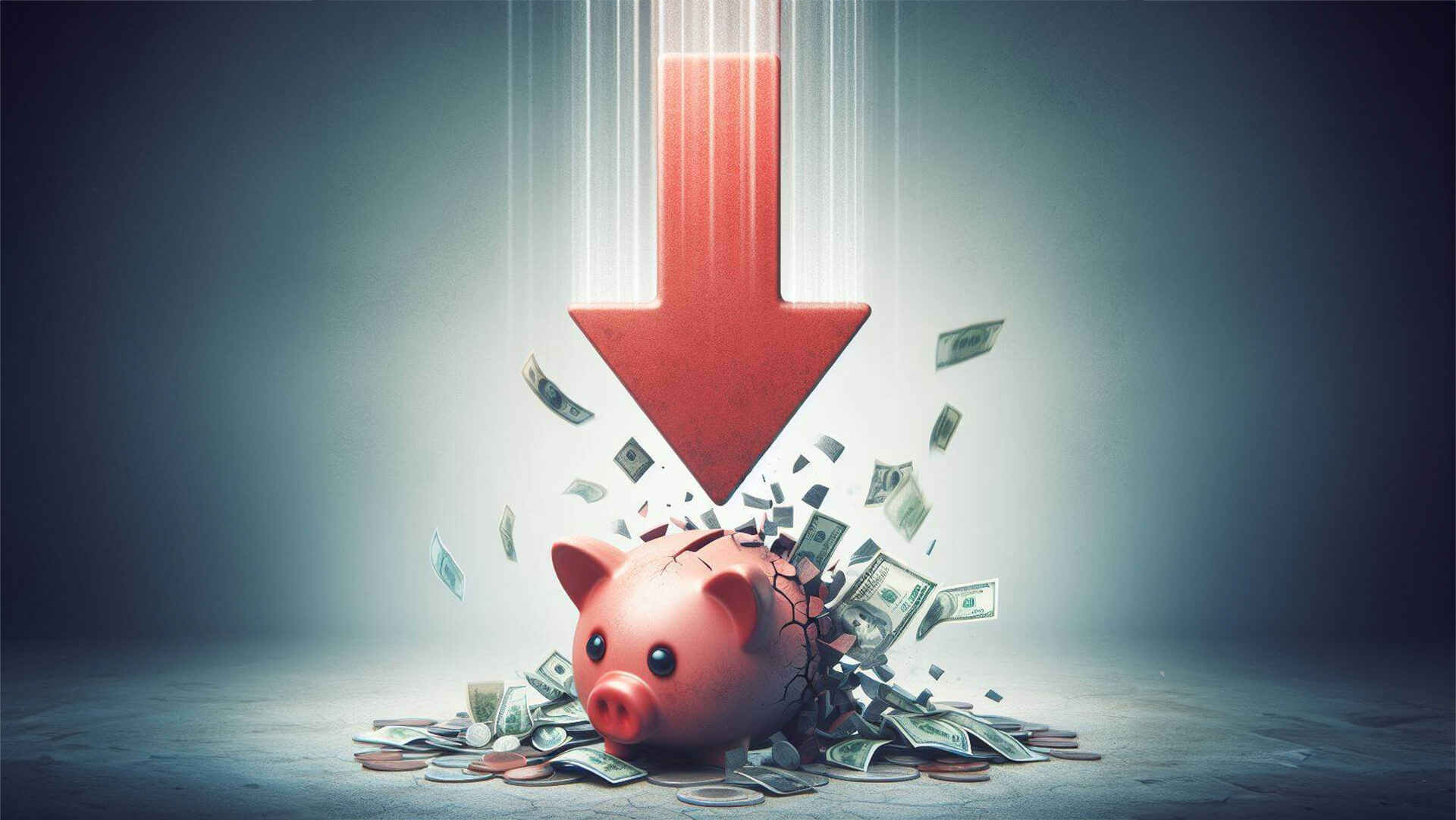In Person Speaking Event
Thanks to The Economic Roundtable, First Settlement Orthopaedics, and Marietta College, I’ll be speaking at the McDonough Auditorium on the campus of Marietta College.
Date: Wednesday, March 27, 2024 at 7:00pm.
We’re all quite familiar with the concept of inflation, but inflation’s dark and twisted sister -deflation- doesn’t come out of her shell all that often. So, for our next episode of ‘Things I Worry About’ we’re talking about deflation.
Deflation is when prices drop due to low demand, which causes a downward economic spiral. Some examples of this are the Great Depression in the US and Japan during the 90s. We’re now seeing mounting deflationary pressures in the Chinese economy that could have devastating consequences.
With some sectors exhibiting inflationary activity and others facing deflationary activity, there will be some complex challenges to overcome. When I find myself staring at the ceiling late at night, pondering the ‘flations, I often find that deflation is what really worries me…
Here at Zeihan On Geopolitics we select a single charity to sponsor. We have two criteria:
First, we look across the world and use our skill sets to identify where the needs are most acute. Second, we look for an institution with preexisting networks for both materials gathering and aid distribution. That way we know every cent of our donation is not simply going directly to where help is needed most, but our donations serve as a force multiplier for a system already in existence. Then we give what we can.
Today, our chosen charity is a group called Medshare, which provides emergency medical services to communities in need, with a very heavy emphasis on locations facing acute crises. Medshare operates right in the thick of it. Until future notice, every cent we earn from every book we sell in every format through every retailer is going to Medshare’s Ukraine fund.
And then there’s you.
Our newsletters and videologues are not only free, they will always be free. We also will never share your contact information with anyone. All we ask is that if you find one of our releases in any way useful, that you make a donation to Medshare. Over one third of Ukraine’s pre-war population has either been forced from their homes, kidnapped and shipped to Russia, or is trying to survive in occupied lands. This is our way to help who we can. Please, join us.
TranscripT
Hey everyone. Peter Zeihan here, I am coming to you from Monterey Bay in California, where I just spoke to the Naval Postgraduate School on threats and evolutions in the international system. Today, we’re going to take one of the questions I was asked there and turn it into a video for our ongoing open ended series on things that I do or do not worry about.
This is one that I do worry about. Specifically, it’s about deflation. Now, before we get into deflation, for those of you who are not economists, we need to define what that is. And I think the best way to do that is to put in the context that everyone would recognize readily. So we’ve all heard about in inflation and inflation has been a well foe for most countries in most of modern history.
And it pretty much happens whenever there’s a disconnect between supply and demand. Either supply of a product is insufficient or demand for that product is too high. Now, I don’t mean to belittle the inflation pain that people have been feeling on and off for the last few years. It’s very real. It’s no fun at all. But one of the beautiful things about inflation and combating it is it’s relatively self-regulating.
So if inflation is too high, one of two things can very easily happen. Number one, the producers of a product are now incentivized to produce more of it because they can charge more, in which case you generally bring the supply demand back into balance. Or second, people can get tired of paying so much and so they can buy less.
And so either supply can go up or demand can come down. And those will happen naturally without any action from government. I don’t mean to suggest government doesn’t put their finger on the scale here. Of course they do. But the self-regulating nature of inflation means it’s a more manageable problem in comparison. Deflation is like the the hideously ugly, bitchy little sister of inflation because it’s not self-regulating when you have a break between supply and demand.
In an era where demand falls below supply. Prices start to drop, but eventually it builds expectations among consumers that they’re going to continue to drop. And so people put off their orders. Well, if that happens, then all of a sudden companies that are making these products tend to produce less of them because they can’t make any money. And then people start to be unemployed.
And when people are unemployed, their demand goes down because they don’t have the money. And so while as inflation tends to self limit, deflation tends to self reinforce and build below, this policy set that can get you out of deflation is an order of magnitude more difficult. So we’ve all heard inflation, this inflation that on and off for the last few years and honestly for the last 75.
But deflation, when it gets its claws into the economy, can be really, really terrifying. It can take decades to fix. And oftentimes on its way out, it does a lot of damage. So, for example, the last time we had meaningful deflation in the United States was during the Great Depression, and we got in a wage spiral that went up, but a product spiral that went up more in the Roaring Twenties.
And what that eventually did was supply exceeded demand and then led to a plunge in everything that ultimately culminated to the Great Depression. And if it hadn’t been for the stimulus that we saw moving into World War Two from the government for the military buildup, we may have never recovered. A more recent example is in Japan. We’re in the 1990s, they were boom, boom, boom, boom, boom.
But eventually their product production got so high that they overwhelmed the domestic market. Starting off a three decade period of deflation that they’ve only very recently recovered from. And as a result of the American experience in the Great Depression, GDP dropped by a third. And in the Japanese situation, we had basically 0% economic growth for 30 years. And the Japanese economy of 2024 is almost the same size as the Japanese economy of 1995.
Now, where is this an issue? Well, any country that has a significant export portfolio for finished goods but has run out of young people to consume them is in some degree in danger. The two economic systems in the world where that is most true are the gemalto centric systems of Central Europe and then, of course, the Chinese system.
Of the two, I am much, much, much more worried about the Chinese system in the case of Germany. There has been a recognition that a lot of the model needs to change. Most of the energy use to come from the Russian system and a lot of the end product used to go to China. And since there is a recognition that neither of those are long term solutions for the Germans, there’s already a significant amount of industrial restructuring.
And as a rule, when you have restructuring, you’re going to have an inflationary impulse because things are moving around. That doesn’t mean that the risk is zero, but it does mean at least some of the normal economic processes are taking effect and inflation tends to self-correct. China is a much bigger problem. Every couple of months we get even worse demographic information about the Chinese system.
We now know that they’re not just running out of teenagers and twentysomethings, but 30 somethings and 40 somethings. So the age group that would normally do the the consumption is getting smaller and smaller and smaller and smaller. At the same time, China’s dependance on exports gets higher and higher and higher and higher. All it would take is a significant policy change and not even a very large one from a major economy.
The United States and Western Europe are the two biggest chunks that would restrict Chinese exports and all of a sudden all of that product gets locked up in the Chinese system itself. We also know that 70% of private citizens in China is locked up in real estate in an industry where there are more spare apartment units than anywhere else in the world.
And in fact, if you lose so many spare units now that are representative of people’s wealth, then you could house more people in China in those spare units than the rest of the world has spare housing units by us of five. None of this works, and it’s a recipe for a deep deflationary system. And if you want to make it just a little bit more complex and a little bit more problematic, it is perfectly capable.
A system is perfectly capable of having deep deflation and inflation at the same time. So again, the Chinese system, this is a country that imports 80% of its energy. This is a country that imports more food than any other country in the world. And this is a country that imports most of the inputs that allows them to grow their own.
You can have inflation in energy and food at the same time you have deflation and overall consumer demand and manufactured goods and that mix we have never seen before. And I can guarantee you it would be ugly. So, yes, the inflation is an issue that I do have concerns about in specific parts of the world. Next topic.




